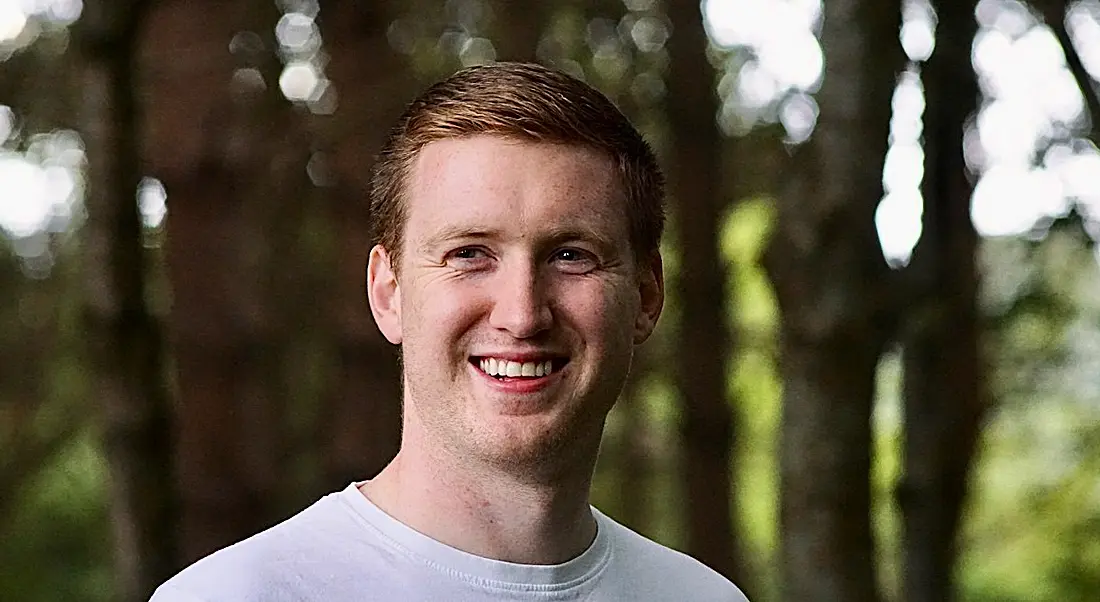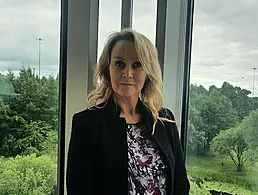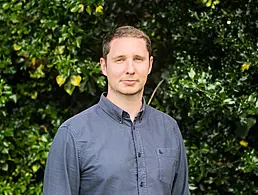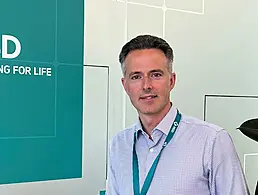Daniel Moore explains why honesty is the best policy in data science and why the best models and most sophisticated techniques are not what matters most.
Daniel Moore is a lead data scientist at Liberty IT with a decade of experience in the analytics and data science field.
He has a background in biophysics and has worked in diverse fields such as cancer research, drug design, the mobility sector and insurance.
Moore told SiliconRepublic.com that his love for maths and physics were what started him on his STEM career. By the time it came to choosing what to study in university, it was between computer science and human biology. But the latter won out.
“I know there was a turning point in my education and one person that shaped how I got here. In your final year of most university degrees, you undertake a research project. Essentially you work with a professor to explore your thoughts on how to solve a novel problem. Mine was Frank,” he said.
“As part of this, I worked with a new group of people who were all really friendly and devoted time to helping me learn. No question was too stupid. This was my first time programming. I remember how amazing it felt to solve mathematical problems automatically and with incredible speed. I didn’t know such a field existed where I could work in biology and explore my love for technology and computers.”
This experience made him change his career plans. He did a master’s degree in computational biology, now known as bioinformatics, and went to complete a PhD in biophysics and drug design.
“I was exposed to the real tangible impact of data science on humans,” he said. “How we can leverage data to screen for cancer automatically, to design and develop new drugs in a move toward a disease-free world preventing unnecessary suffering and death. I may have got here by chance, but I stayed because the impact and use case were just incredible.”
‘The models you produce as a data scientist are useless if you cannot explain how they work’
– DANIEL MOORE
What brought you to your current role in Liberty IT?
When you finish your PhD or your degree, one question always gets asked, should I continue in academia or move to industry? However, a good work-life balance was important to me so I decided against studying medicine and chose to explore a career in industry.
It wasn’t an obvious choice. I applied to be a lecturer before submitting my CV to a small local start-up company to work as something called a ‘data scientist’. It was the first time I heard that term, and with a fear of interviews, I almost didn’t go. Looking back, I’m so glad I took that opportunity for multiple reasons – to experience a career in industry, within a start-up and as a data scientist.
For two years I was fortunate enough to work within the mobility sector on cutting-edge tech such as self-driving cars, biometric wearables and how we can use such sensors to improve driver safety. I got to work with some amazing tech and OEM car brands such as Bentley and Volvo, and experience that start-up culture even working in Silicon Valley for a brief time. However, start-up life is difficult, your input directly shapes the future of the company, and you feel a tremendous amount of responsibility.
I decided to make a change and joined Liberty IT as a senior data scientist. What drew me to this job was the diversity of projects and the impact they could have. Like many, I would hear the word ‘insurance’ and practically fall asleep with boredom. However, this is certainly not the case here and the projects I get to work on would put this stereotype to shame.
I never realised just how much insurance impacts our everyday lives, making things right when something unfortunate happens. The projects I get to work on impact the everyday person. Moreover, I have always enjoyed learning. The sheer diversity of projects within computer vision, natural language processing, predictive modelling and MLOps provide enough learning for a lifetime.
No one wants to do the same thing day in, day out, and that’s the beauty of data science in general – it’s an emerging discipline and that means you need to constantly learn and adapt. It was one of the great aspects of research and now is part of my career as a data scientist. I love it.
What were the biggest challenges you encountered on your career path in analytics?
As a data scientist, you tend to work on solving various problems by developing statistical models and learning from historical data. However, you often need to explain some insights and your methodology to solve a given problem in the manner that you did.
The difficulty is that you need to explain this to a non-technical individual, the ‘stakeholder’. It’s all too easy to pull the wool over someone’s eyes and razzle-dazzle them with fancy terminology and buzzwords. Data science is a disciple where you need to be honest, show in a non-biased way your insights and recognise there are a plethora of methods to solve any given problem.
No matter how experienced you are, sometimes you will not be able to solve that problem, your approach might be incorrect, and you’ll often be the bearer of bad news: “Sorry Mr Stakeholder, it’s unrealistic to train a model to be 100pc accurate.”
It’s incredibly challenging to be so honest with your insights. In fact, to progress your career in data science it often feels like you need to develop the best performing model and use the most sophisticated techniques. There have been times in my career when I have chosen to have the easier conversations, to be passive rather than debate why a problem might not be possible to solve with data science.
My advice is always be honest, always have those difficult conversations, push back when you need to and have the confidence to speak openly to your stakeholders regardless of their seniority. Ultimately, people will have more respect and trust for you if you do.
Was there any one person who was particularly influential as your career developed?
I would say there was a combination of people that influenced my career. My university professor Frank helped give me the confidence to ask the stupidest of questions and sparked my initial interest in research. Irina, my PhD supervisor, showed me what it takes to strive for perfection, and my first boss Gawain helped show me the reality of the commercial world.
On another side, some individuals have explained complex topics in ways that really helped me understand them. Josh Starmer for example, the individual behind StatQuest videos on YouTube. He helped me appreciate that everyone can understand the most complex topics.
What aspects of your personality do you feel make you suited to analytics?
The most obvious trait is the logical part of me loves the methodical nature of data science. If you are new to the field, it may feel like there are a million and one ways to analyse data or create a predictive model. However, there is method to the madness and as you gain experience you realise that most projects follow a similar lifecycle.
I think there are a few other areas which are well suited to a career in analytics. I am the type of person who needs to understand fully how something works. This inquisitive nature drives me to ask questions and get to the root of a problem. It helps to be inquisitive and understand how your solution will solve the actual problem.
Lastly, communication and collaboration are everything in data science. You can be the most technically proficient individual, however, the models you produce as a data scientist are useless if you cannot explain how they work and can then collaborate with your team to move your model into production, to consume real-world data and make actionable insights.
What can people expect from career progression in the analytics industry?
Data science is one of the most diverse fields imaginable. Frankly, it’s overwhelming. The norm for progressing to a more senior role is to deepen your knowledge in one of the three big areas of data science – computer vision, NLP or predictive modelling – before branching out into another area.
Try to ignore the feeling that you need to be knowledgeable across all of these areas. If you are reading a job description that is asking for knowledge across all three disciplines, they don’t need a single data scientist, they need a full team of specialists.
At Liberty IT, one of the questions we ask all new starts is what area excites you the most in data science? Ultimately, if you have never worked on a computer vision project but are eager to explore this side of data science, they will pair you with an experienced individual to help you learn and progress in that area.
I feel like there is a real emphasis on training and development at Liberty IT that makes it much easier to progress your career. Everyone in our team is given the opportunity to take on board other responsibilities that help develop their career, such as interviewing, supervising more junior employees and teaching others within the data science community. It’s honestly a really nice place to work.
Lastly, I think there is a misconception about career progression in the tech industry. Many think that a promotion simply means more money. As you progress in your career your responsibility changes. I think it’s worthwhile reflecting on what type of work you enjoy the most, the technical aspect or the management and strategy side.
What advice would you give to those considering a career in analytics?
It’s my opinion that the most interesting careers are the ones that you find difficult to describe to your parents, what exactly it is you do, and where you define the language of your discipline.
Data science and the general field of analytics have been exactly this for me. It’s changing rapidly and there’s a lot to learn.
If you’re starting your career in analytics or data science, imposter syndrome is something you need to be mindful of. Don’t panic about not knowing everything. Ask questions and be open to learning new things.
10 things you need to know direct to your inbox every weekday. Sign up for the Daily Brief, Silicon Republic’s digest of essential sci-tech news.




